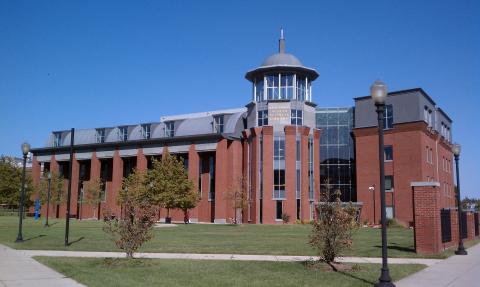Graduate Studies
The Department of Biology has diverse, numerous disciplines of research and training activities that span from genetic and molecular studies, through cell and physiological investigations, and finally up through evolutionary, ecological and environmental exploration and discoveries. The faculty makeup is just as diverse, with researchers investigating developmental and genetic programming events, population genetics and biostatistics, host-microbe interactions and microbial ecologies, immunological and nervous systems, molecular plant biology, ecology and bioremediation, and also invertebrate aquatic system and evolutionary biology.
Science continues to remain at the forefront of information, technology, and engineering; the Department of Biology continues this tradition by intertwining the rich multidisciplinary approaches to provide a well-rounded, but specialized research training to ensure successful, competitive careers in research enterprise.
The Department of Biology offers a graduate program that leads to the Doctor of Philosophy degree in two major areas of concentration: 1) Cell and Molecular Biology (CMB) and 2) Ecological, Environmental and Systematic Biology (EESB). CMB offers specialization in immunology, cell biology, molecular biology, genetics, neurobiology, physiology, developmental biology, microbiology and bioinformatics, while EESB offers specialization in ecology, evolutionary biology, environmental biology, conservation biology, and organismal biology. Incoming graduate students may elect any area of their choice leading to the Ph.D. degree. The department also participates in the M.D./Ph.D. degree program jointly offered by the Graduate School and Howard University College of Medicine, and in the HU-CCR Cancer Track, a joint program with the Center for Cancer Research at the National Cancer Institute, focused on cancer research.
Please use the website to explore the multi- and interdisciplinary program, where you will find detailed information about admissions and the interview process, program structure, course curriculum, and pathway to the PhD, funding, faculty research and infrastructure, and even our student directory and alumni center.
Welcome message from the Graduate Program Director
I would like to welcome you to the Department of Biology Graduate Program. Howard University continues to serve as the pinnacle program in the training and development of innovative leaders entering into research enterprise. We continue to look for highly motivated and ambitious students who can continue the rich tradition of investigation and exploration of the diverse disciplines within biological sciences.
Dominique Pritchett, Ph. D.
Email: dominique.pritchett@howard.edu
Director of Graduate Studies
Department of Biology
Graduate Program Requirements
Doctorate In Philosophy (Ph.D.)
A total of 72 credit hours is required and divided as follows:
- Core Courses: 11 - 12 hours
- Elective Courses: 27 - 28 hours
- Graduate Seminar Courses: 2 hours
- Research: 19 hours
- Thesis: 12 hours
Please be advised:
- Credit will not be given for more than the required twelve hours of Thesis
- Students should not enroll in Thesis until they have been admitted to candidacy
- Letter grades will not be given for more than twelve hours of research
- The electives may include additional research credits for which letter grades will not be given
- Students in the Ph.D. program should not expect Departmental support in the form of a graduate assistantship beyond five years
All Ph.D. candidates are required to take any three of the following four core courses prior to applying for candidacy:
One (1) course from each of the following two groups of courses:
1. Cellular and Molecular Biology
Biochemistry
Molecular Biology of the Cell
2. Ecology, Environmental and Systematic Biology
Ecological and Environmental Biology
Evolutionary and Systematic Biology
Please be advised that two semesters courses of Graduate Seminar are required including:
- (a) Graduate Seminar, 280-500, 1 credit hour
- (b) Graduate Seminar, 280-501, 1 credit hour
** All graduate-level courses (400-level and above) in the department may be used to satisfy degree requirements.


